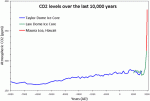Liar.
I call it like I see it, and you are a liar.
Who here says the oceans are not warming?
Come on now... Who!
You warmers are so caught up in the BS, that you have to lie about what the opposition says.
Who says the oceans are not warming?
See... You build a strawmen.
LOL...
You make up what you think I mean, but it only proves you are utterly clueless!
Yes, it is both. And one can conveniently be diminished by the pundits to make the other look like it is more.
What about the other variables? Do you even know what they are?
I'll bet you don't!
No, I did NOT "build a strawman". Here, from
one of the more popular AGW-denial sites:
Oceans are cooling
“Ocean heat touches on the very core of the AGW hypothesis: When all is said and done, if the climate system is not accumulating heat, the hypothesis is invalid.
[…]Now that heat accumulation has stopped (and perhaps even reversed), the tables have turned. The same criteria used to support their hypothesis, is now being used to falsify it.” (William DiPuccio)
Okay? No strawman. Simple fact. I didn't say "all" the AGW crowd - I said "most"...and I base that on the fact that the above is posted on one of the most popular AGW-denial sites.
As to the "other variables", I've seen many presented by AGW deniers. Problem is, y'all's contention that "it's not humans, it's this other variable or that other variable!" is based upon:
(1) the presumption that the overwhelming majority of the world's scientists (not just climatologists, but all the other scientific fields which affect or are affected by the climate) somehow missed these variables, or refused to consider them. This means that the overwhelming majority of the world's scientists are somehow ignorant or stupid or malicious...and this presumption is also a largely baseless ASSUMPTION that the scientific community has never examined these other variables and one-by-one eliminated them; or
(2) (and I've seen this many times) - that most (if not all) scientists who support AGW theory do so with the knowledge that AGW is false, but support AGW because they're afraid of what the scientific community would do to their careers. This claim goes on the assumption that the overwhelming majority of scientists are cowards, unable or unwilling to stand up for what they know to be right...that out of the hundreds of thousands of PhD-holding scientists, only a very small percentage of them are mentally strong enough to stand up for what they know to be right. What this presumption completely misses is that one of the things that brings the most joy to ANY scientist is the opportunity to stand orthodoxy, what the rest of the scientific community knows, on its head. Scientists LOVE to go against the grain...and are anything BUT the monolithic group that many AGW deniers (like our resident Jack Hays) seem to think; or
(3) "It's just a theory and so it can't be trusted!"...without ever bearing in mind that the scientific community's theory is far more stringent than most of us realize. For example, the following are theories, even though most of us non-scientists accept them as solid fact: gravity, general relativity, plate tectonics, black holes (IIRC), and evolution.
What most AGW deniers refuse to consider is that the underlying reason they despise the very idea of AGW has little to do with actual science, and everything to do with politics...particularly given the fact that the quickest way to be declared a RINO (or CINO for conservatives) is to agree with liberals on anything whatsoever...even when all the liberals are doing is agreeing with the overwhelming majority of the world's scientific community.






